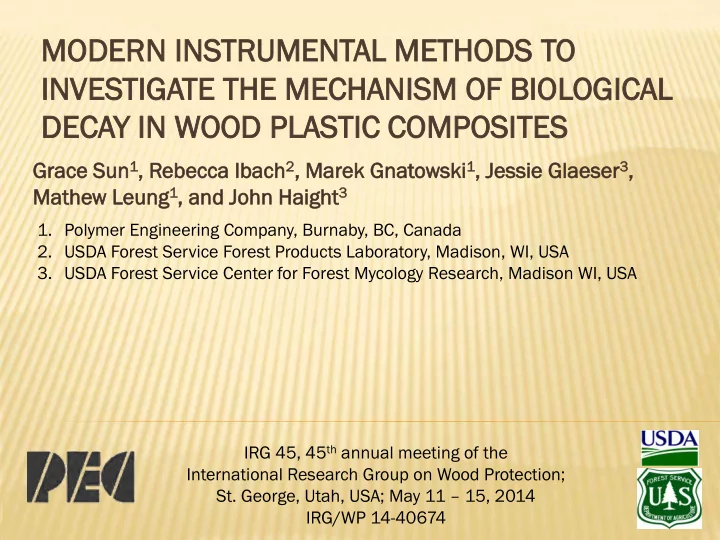

MODE MO DERN RN INS INSTR TRUMENT UMENTAL AL ME METH THOD ODS T S TO O INV INVES ESTIG TIGATE TE TH THE MEC E MECHANIS HANISM M OF OF BIO BIOLOG OGIC ICAL AL DECA DE CAY IN Y IN WOOD OOD PL PLAS ASTIC TIC CO COMP MPOSI OSITES TES Gr Grace ace Sun un 1 , , Reb ebecca ecca Iba bach ch 2 , , Ma Marek rek Gn Gnat atowski wski 1 , , Je Jess ssie ie Gl Glae aese ser 3 , , Ma Mathe thew w Leung eung 1 , , an and d Jo John hn Haig Haight ht 3 1. Polymer Engineering Company, Burnaby, BC, Canada 2. USDA Forest Service Forest Products Laboratory, Madison, WI, USA 3. USDA Forest Service Center for Forest Mycology Research, Madison WI, USA IRG 45, 45 th annual meeting of the International Research Group on Wood Protection; St. George, Utah, USA; May 11 – 15, 2014 IRG/WP 14-40674
OUTLINE Objective CT Imaging void analysis Laboratory (experimental) samples Field (commercial) samples MR Imaging Field (commercial) samples Conclusions Acknowledgements
OBJECTIVE To investigate novel non- destructive approaches for evaluating internal damage and moisture content in wood plastic composites (WPC) with a focus on decay CT Micro- and Nano- X-ray Computed Tomography (CT) Magnetic Resonance Imaging (MRI) MRI
EXAMPLES OF DECAY IN FIELD WPC’S Everglades, Fl; Gnatowski Hilo, Hi; Mankowski Hilo, HI; Laks Everglades, Fl; Gnatowski Everglades, Fl; Morris Hilo, HI; Gnatowski Hilo, HI; Laks
INSPECTION OF FIELD SAMPLES Comparison of commercial decking board reference and exposed cross-sections did not seem to show decay Field Reference 68% wood loss Exposed
CT IMAGING: LABORATORY SAMPLES Various void analysis perspectives of Lab Reference sample 3D overview Defect volume [mm 3 ] 3D 0.020 0.018 volume 0.016 0.014 0.012 0.010 0.008 2D 0.006 slice 0.004 0.002 0.000
CT IMAGING: LAB REFERENCE 3D volume Defect volume [mm 3 ] Detected void 0.020 volume: 1.3% 0.018 0.016 0.014 0.012 0.010 0.008 0.006 2D slice 0.004 0.002 0.000
CT IMAGING: LAB CONDITIONED 3D volume Defect volume [mm 3 ] Detected void 0.150 volume: 2.7% 0.135 0.120 0.105 0.090 0.075 0.060 2D slice 0.045 0.030 0.015 0.000
CT IMAGING: LAB CONDITIONED & DECAYED 3D volume Defect volume [mm 3 ] 4.000 Detected void 3.600 volume: 12.3% 3.200 2.800 2.400 2.000 1.600 2D slice 1.200 0.800 0.400 0.000
CT IMAGING: 2D SLICES IN CORE VOID VOLUMES Lab Reference Lab Cond.&Decayed Detected void Detected void Defect volume [mm 3 ] Defect volume [mm 3 ] volume: 11.4% volume: 2.3% 0.020 4.000 0.018 3.600 0.016 3.200 0.014 2.800 2.400 0.012 0.010 2.000 1.600 0.008 0.006 1.200 0.004 0.800 0.002 0.400 0.000 0.000
CT IMAGING: REFERENCE FOR FIELD SAMPLE 3D volume Defect volume [mm 3 ] Detected void 2.000 volume: 4.9% 0.180 0.160 0.140 0.120 0.100 0.080 0.060 2D slice 0.040 0.020 0.000
CT IMAGING: FIELD SAMPLE (8YRS IN HAWAII) 3D volume Defect volume [mm 3 ] Detected void 2.000 0.180 volume: 28.7% 0.160 0.140 0.120 0.100 0.080 2D slice 0.060 0.040 0.020 0.000
SEM VERIFICATION OF DECAY IN FIELD SAMPLE Fungi were present in voids in all examined areas of the Field Exposed sample Wood was heavily degraded with severe destruction
MR IMAGING: FIELD EXPOSED (8YRS IN HAWAII) Slice 7 Slice 2
CONCLUSIONS X-ray CT is an effective method for imaging the internal structure of WPC’s and detection of voids, including those associated with decay MRI is an effective method for detecting free water distribution in WPC’s A significant degree of WPC damage by decay was found in a commercial decking board exposed for 8 years in Hawaii Moisture content and distribution of this material provide insight into the mechanism of decay
ACKNOWLEDGEMENTS The authors of this paper would like to thank: GE Inspection Technologies, LP for the use of their phoenix|x-ray nanotom m, and Dr. Meghan Faillace, lead applications engineer for GE Inspection Technologies, LP for her assistance, expertise, and CT imaging of the WPC materials Irene Kinoshita of Canadian Magnetic Imaging for her assistance, expertise, and MR imaging samples of WPC boards
QUESTIONS?
CT IMAGING: LABORATORY SAMPLES Experimental formulation containing 66% pine wood flour and 24% HDPE, with UV stabilizers Lab Reference (8R2) Lab Conditioned* (8G2) Lab Conditioned* and Decayed (8F2) Sample ple Voi oid d Volu olume me [% [%] Detect ected ed Vol. ol. Ra Range ge [m [mm 3 ] 2.8 x 10 -6 - 1.9 x 10 -2 Lab Reference 1.7% (0.5) 2.8 x 10 -6 - 0.81 Lab Conditioned 3.8% (1.2) 2.8 x 10 -6 - 4.9 Lab Cond.&Decayed 12.5% (1.2) *Water immersion for 5 days at 70 ° C ( ) std dev.
CT IMAGING: FIELD SAMPLES Commercial decking board with 53% wood flour Reference (1000R) Field-Exposed (1000B) shadow site near Hilo, Hawaii for 8 years Sample ple Voi oid d Volu olume me [% [%] Detect ected ed Vol. ol. Ra Range ge [m [mm 3 ] 8.0 x 10 -6 - 0.52 Reference 5.4% (4.3) 8.0 x 10 -6 - 15 Field-Exposed 31.3% (4.9) ( ) std dev.
HISTORICAL DATA FOR FIELD SAMPLE 50 1000 51 Months Exposure 45 1000 40 Months Exposure 1000 28 Months Exposure 40 1000 12 Months Exposure MOISTURE CONTENT (%) 35 Reference Unexposed 30 MC DECAY INITIATION 25 20 15 10 5 0 0.0 0.2 0.4 0.6 0.8 1.0 NORMALIZED DISTANCE FROM SURFACE
NANO-CT IMAGE OF FIELD SAMPLE 0.3mm
Recommend
More recommend